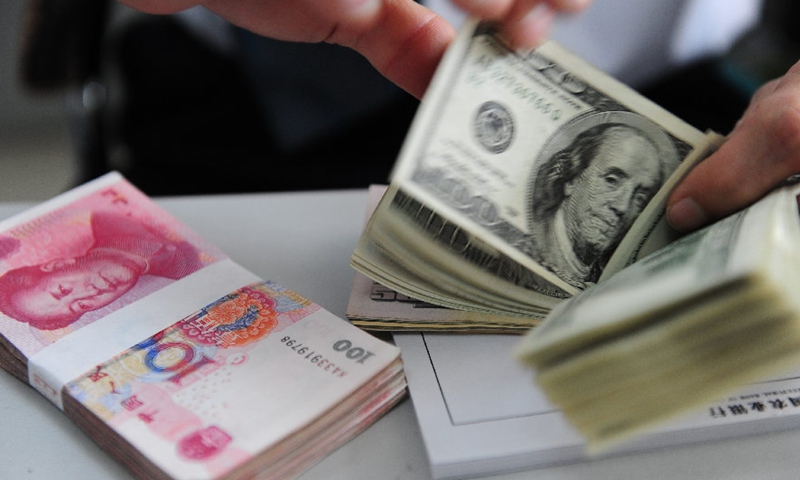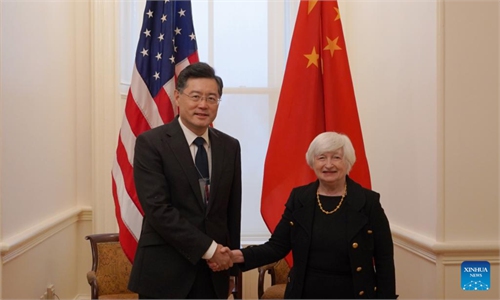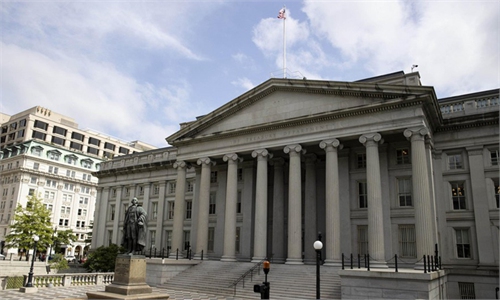
A teller counts U.S. dollar bills at a bank in Qionghai, south China's Hainan Province.Photo:Xinhua
China reduced its holdings of US Treasury debt for the sixth straight month in January, which analysts said was mainly due to the US Federal Reserve's rate hikes and China's long-term security-driven diversification of its foreign exchange reserves.
The US Department of the Treasury released data on Wednesday (local time) showing that China's holdings of US Treasury debt dropped to $859.4 billion in January, declining for the sixth straight month and falling below $1 trillion, where it has been for every month since last April.
China's holding of US government debt is at its lowest since May 2010, when it held $843.7 billion.
However, China remains the second-largest non-US holder of US debt after Japan, which held $1.104 trillion as of the end of January.
Slashing investments in US Treasuries, which are an important component of China's $3 trillion-plus in foreign reserves, shows the flexibility of Chinese financial institutions' asset allocation and the diversification of investment portfolios, amid higher dollar interest rates and a volatile international environment, analysts noted.
"The value of US Treasuries started to fall when the US Federal Reserve started to hike interest rates in March 2022, while asset values in other developed economies such as the EU and Japan were relatively higher due to lower interest rates." Zhao Qingming, a Beijing-based veteran financial expert, told the Global Times on Thursday.
"As a method to optimize investment, it's natural for Chinese institutions to cut holdings of US government debt," Zhao said.
After seven aggressive interest rate hikes to tame inflation in 2022, the Fed raised the target for the federal funds rate by 0.25 percentage points in February. Generally, investors tend to sell off US Treasuries when interest rates increase, given their demand for higher bond returns.
China's holdings of US Treasuries fell below $1 trillion for the first time in 12 years last April.
The second-largest creditor's fire sale signals waning confidence, as the US faces economic woes such as its debt ceiling debacle and turmoil in its banking sector, Gao Lingyun, an expert at the Chinese Academy of Social Sciences in Beijing, told the Global Times on Thursday.
The US has only itself to blame, Gao said. "It's time for the Biden administration to stabilize the US economy and its financial policies to create more certainty for global investors," he told the Global Times on Thursday.
Foreign countries may now be less motivated to sell off US Treasuries, as the Fed is expected to slow down interest rate hikes in the coming months, Zhao forecast.
However, it could be a long-term trend for China to diversify its foreign exchange reserves faster into other currencies or assets, as the US' weaponization of the dollar poses greater risks for holders of US Treasuries, according to Chinese experts.
The US has used its financial services as a weapon against Russia amid the Russia-Ukraine conflict to a scale and depth unseen before. Taking it as a lesson, countries around the world have recognized the importance of diversifying their dollar-denominated assets.
For example, Iraq's central bank is reportedly planning to settle trade from China in yuan for the first time to improve its access to foreign currency, Reuters reported.
China has been promoting the use of the yuan in bilateral trade and investment over recent years. It has become the world's fifth-largest payment currency, third-largest currency in trade settlement and fifth-largest reserve currency, official data showed.
China's foreign exchange reserves stood at more than $3.13 trillion at the end of February, down $51.3 billion, or 1.61 percent, from the end of January, according to latest data released by the State Administration of Foreign Exchange.



